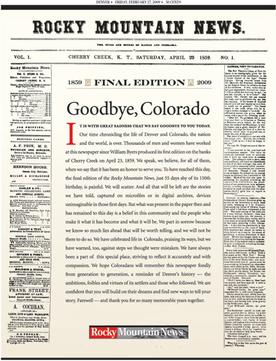
How the Denver Public Library ended up owning the Rocky Mountain News archive

Among the many stories shared at the recent “Dodging the Memory Hole” forum at the Donald W. Reynolds Journalism Institute, none were more gripping and significant than the tale of how the Denver Public Library ended up owning the Rocky Mountain News archive.
Like any good investigative report, the backstory is important to understand because there are valuable lessons to be learned from how it all happened. And since, to my knowledge, this is the first case of a metro newspaper’s entire archive being gifted to a public library, the legal precedent this sets is a noteworthy gift to those of us who want to save news content for future generations.
This story begins sometime in the 1980s when several hundred thousand Rocky Mountain News photographs were apparently given to the Denver Public Library with only a sketchy memo-of-understanding. Jump to 2006 when a convention for newspaper cartoonists used the library for a reception. Jim Kroll, manager of the library’s Western History/Genealogy department met the Rocky’s editor and publisher, John Temple, at the event. Kroll informed Temple about the library’s possession of 40 years of images from the Rocky. Temple’s dry-humored response: “We wondered what happened to them.”
Thus began a relationship between the two organizations that eventually explored a possible partnership to market historic images from the collection. An agreement was drafted, but on February 27, 2009, E. W. Scripps Company, the owner of the Rocky, decided to shut down the newspaper. Temple recommended that Scripps give the entire Rocky archive to the Denver Public Library.
According to Kroll, “The only property that Scripps did not grant to the library was the Rocky’s URL and trademark, which it sold to a third party. Specifically, the archival digital assets that Scripps gave (included) over 400,000 born-digital photographs, cached copy of the rockymountainnews.com, electronic text of the Rocky Mountain News from 1989 to 2009 and seven years of PDFs of published pages of the Rocky Mountain News.”
“Scripps gifted to the library other archival assets, including management documents, reporters notes, the newspaper morgue, print photographs, a reference book library and artists’ sketches,” said Kroll. “Most of which I boxed and transported across Denver’s civic center from the Rocky’s offices to the library and happily lost 10 pounds in the process.”
“Scripps gifted to the library other archival assets, including management documents, reporters notes, the newspaper morgue, print photographs, a reference book library and artists’ sketches,” said Kroll. “Most of which I boxed and transported across Denver’s civic center from the Rocky’s offices to the library and happily lost 10 pounds in the process.”
The next four years were an exploration of unknown legal territory for both the library and Scripps. There were no known legal precedents to follow in this area, so both parties took extraordinary pains to address the issues involved in a complex transfer of physical and intellectual property. The final version of the Archives Donation Agreement is a rather concise seven-page document, not counting signature and attached exhibit pages.
Luckily, this agreement with the City and County of Denver is a matter of public record. So, in addition to the victory of preserving much of the history of the Denver metropolitan area, the agreement can serve as a guide to future transfers of newspapers to libraries. It’s unfortunate that the closing of newspapers has become all too frequent in the past few years, but at least we have an example of an outcome that doesn’t deprive future generations of the cultural riches available through preserving journalism, including digital news content that originated on a computer or sensor.
I’m left to wonder what might have happened or not happened if the Denver Public Library had not agreed to host that exhibit of cartoonists. What if Jim Kroll had not reached out to John Temple that night in the spirit of collaboration? What if Temple had not seen the library as a potential partner in community outreach and possible revenue stream? One of the lessons I take from “Dodging the Memory Hole” is that there are any number of great opportunities for collaborations and partnerships among those who care about the future of born-digital news content. Let’s all remain open to initiating new conversations in the days ahead. The future of the past depends upon you.
In 2009, the Denver Public Library and Scripps Media entered into an agreement in which the library took possession of the archives of the Rocky Mountain News. The Rocky Mountain News was shut down that year after nearly 150 years of operation.